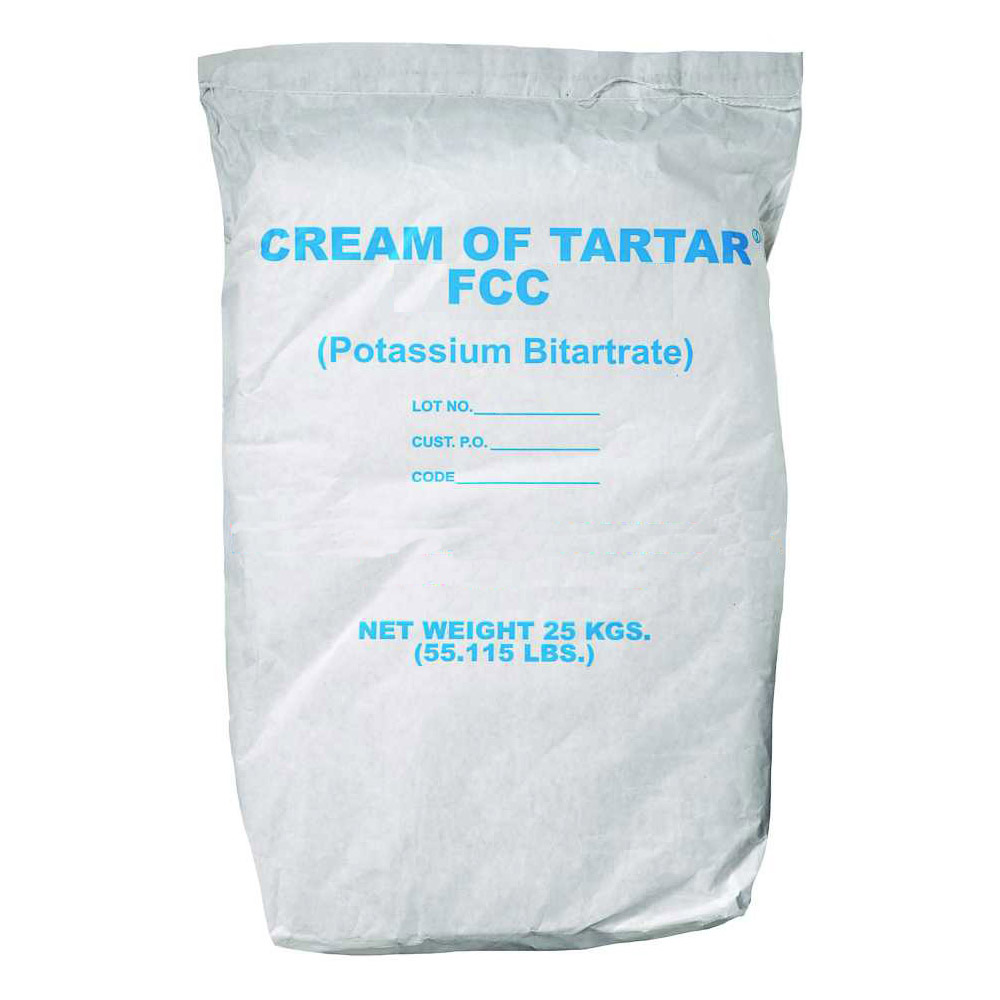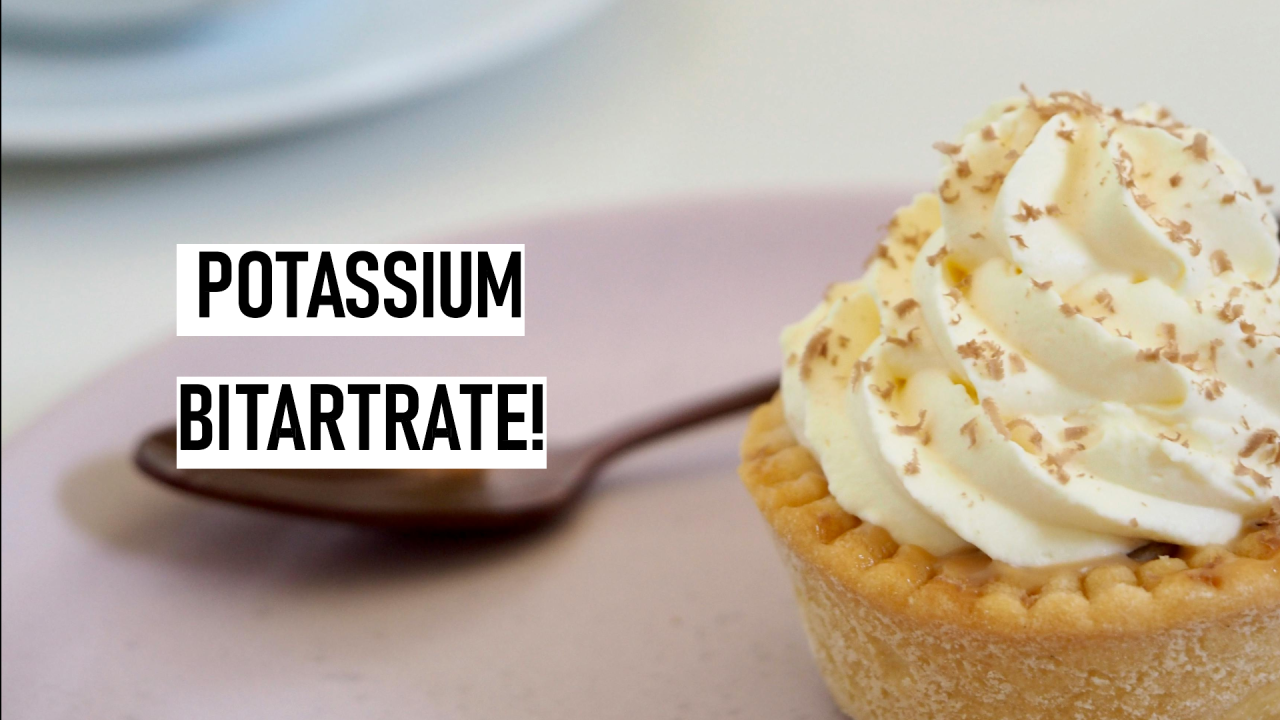📌 Detailed Introduction of Potassium Bitartrate
✔ What is Potassium Bitartrate?
Potassium Bitartrate, commonly known as Cream of Tartar, is a potassium acid salt of tartaric acid that forms naturally during grape fermentation. It is widely used as a leavening agent, stabilizer, emulsifier, and acidity regulator in food and industrial applications.
✔ CAS Number & Chemical Formula:
CAS Number: 868-14-4
Chemical Formula: C₄H₅KO₆
Molecular Weight: 188.18 g/mol
📌 Product Specifications
| Property | Specification |
|---|---|
| Appearance | White crystalline powder |
| Purity (%) | ≥ 99.5% |
| E-Number | E336 |
| Odor | Odorless |
| Solubility | Soluble in water, insoluble in alcohol |
| pH (1% solution) | 3.5 – 4.5 |
| Loss on Drying (%) | ≤ 0.5% |
| Packing | 25kg bags or customized packaging |
📌 Applications of Potassium Bitartrate
✔ Food & Baking Industry
Used as a stabilizer in whipped cream and meringues to maintain texture.
Acts as a leavening agent when combined with baking soda for baked goods.
Helps prevent sugar crystallization in syrups and candies.
Serves as an acidity regulator in baking powders and confectionery.
✔ Wine & Beverage Industry
Byproduct of wine fermentation, used to control wine acidity.
Prevents potassium tartrate crystal formation in bottled wine.
✔ Pharmaceutical Industry
Used as an excipient in medicinal formulations.
A key ingredient in effervescent tablets and laxatives.
✔ Cosmetics & Personal Care
Used in natural exfoliating products.
Serves as a pH adjuster in skincare formulations.
✔ Cleaning Applications
Acts as a non-toxic cleaner for removing stains and rust when mixed with vinegar.
Used as a metal polishing agent.
📌 How Does Potassium Bitartrate Work?
Stabilizing Effect in Baking:
Helps maintain foam consistency in egg whites and whipped cream.
Leavening Agent in Baking Powder:
Reacts with baking soda to produce CO₂, making baked goods fluffy.
Acidity Regulator:
Controls pH levels in food and beverages, improving taste and texture.
📌 Production Method & Raw Materials
✔ Natural Extraction from Grapes & Wine Residues:
Collected from wine fermentation tanks as tartaric deposits.
Purified, dried, and processed into a fine powder.
Packaged for food, pharmaceutical, and industrial applications.
📌 Famous Potassium Bitartrate Brands Worldwide
Tartaros Gonzalo Castelló (Spain)
ATP Group (USA)
Jiangsu Khonor Chemicals Co., Limited (China)
📌 Why Choose Jiangsu Khonor Chemicals Co., Limited?
✔ High-Purity & Food-Grade Certified
✔ Reliable Supply & Competitive Pricing
✔ Custom Packaging & Bulk Availability
✔ Strict Quality Control & Compliance
📌 Order High-Quality Potassium Bitartrate from Jiangsu Khonor Chemicals Co., Limited!
Looking for a trusted supplier of Potassium Bitartrate (Cream of Tartar)? We provide premium food and industrial-grade Potassium Bitartrate for baking, winemaking, and pharmaceutical applications.
📞 Contact us today for a free quote & sample!
Name | Potassium hydrogen tartrate |
Synonym | Potassium bitartrate / Cream of Tartar / Potassium acid tartrate / Monopotassium tartrate / Beeswing |
CAS No. | 868-14-4 / 35-04-1 / 6381-58-4 |
Content | 99.0-101.0 |
M.F. | KC4H5O6 |
Specific rotatory power[A] D20 | +32.5 to +35.5° |
Loss on drying ≤% | 0.5 |
Ammonia | Pass test |
Sulfates ≤% | 0.019 |
Heavy metal ≤ppm | 2 |
Arsenic ≤ppm | 3 |
Application | Stabilizer, Leavening Agent, Prevention of Sugar Crystallization, Acidity Regulation, Cleaning Agent, Stain Remover, Electroplating, baking powder |
1. Applications in the Food Industry
Potassium bitartrate is widely used as a food-grade additive with various functionalities:
(a) Baking and Confectionery
Stabilizer in Egg Whites:
Cream of tartar is added when whipping egg whites to stabilize the foam and increase volume.
Prevents over-beating and ensures a firm, glossy texture for meringues, soufflés, and angel food cakes.
Leavening Agent:
Used with baking soda (sodium bicarbonate) to create baking powder.
Provides the acidic component needed to release carbon dioxide gas, resulting in a lighter texture in baked goods like cakes, cookies, and quick breads.
Prevention of Sugar Crystallization:
Added to sugar syrups in candy-making to prevent crystallization, ensuring a smooth texture in caramels and frostings.
(b) Beverage and Wine Production
Acidity Regulation:
In winemaking, potassium bitartrate may be used to stabilize and reduce excessive acidity during the fermentation process.
2. Applications in the Household
Cleaning Agent:
Mixed with vinegar or water to clean and remove stains from cookware, tiles, or other surfaces.
Stain Remover:
Effective for removing rust, tarnish, or tough stains on fabric.
3. Industrial Applications
Electroplating:
Used in some electroplating processes to improve conductivity and regulate the pH of the electrolyte solution.
Chemical Applications:
Utilized as a component in certain laboratory buffer solutions.
4. Application in Personal Care
Natural DIY Beauty Products:
Occasionally used in homemade cosmetics or scrubs as a natural exfoliant or stabilizer.
5. Benefits and Characteristics
Acidic Property:
As a weak acid, it is particularly useful for balancing alkalinity in recipes or chemical reactions.
Natural and Safe:
Widely recognized as safe (GRAS) by regulatory bodies like the FDA and used extensively in natural and organic formulations.
6. Typical Usage Levels
The amount of potassium bitartrate used varies depending on the application:
In egg whites: About 1/8 teaspoon per egg white.
In baking powder formulation: Typically 2 parts cream of tartar to 1 part baking soda.
In sugar syrups or candies: A small pinch to a teaspoon, depending on the recipe.
Conclusion
Potassium bitartrate is a multifunctional and indispensable ingredient in culinary, industrial, and household applications. Its stabilizing, leavening, and cleaning properties make it a versatile and eco-friendly choice across various domains.


